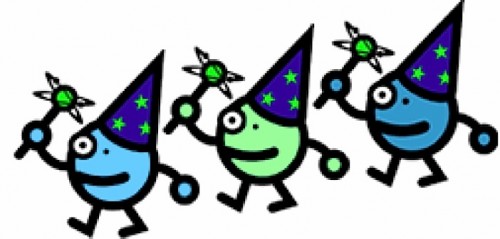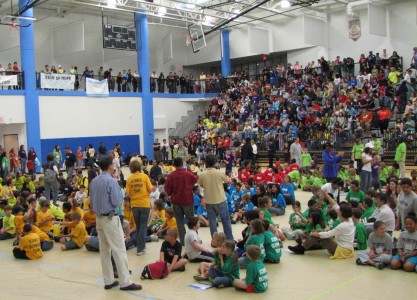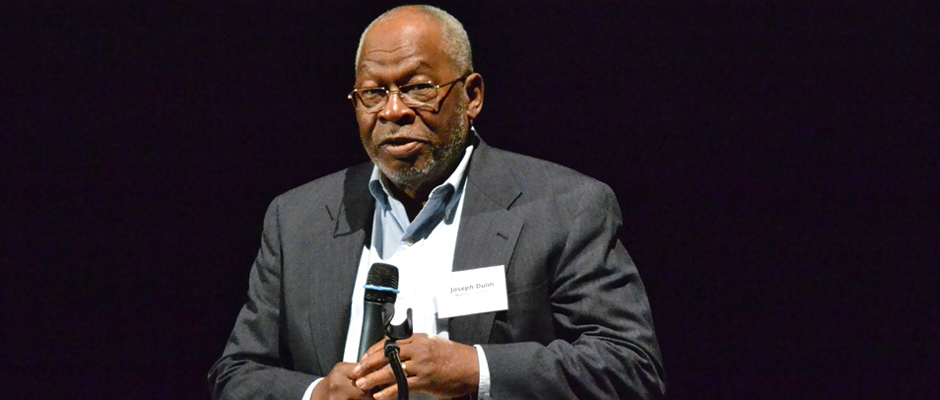By Casey Hans
AAPSNews Service
Junior scientists, volunteer coaches and science lovers are already gearing up for the 2011 Washtenaw Elementary Science Olympiad, which takes place each spring.
This is the time of year when events are planned for the annual, team-powered Olympiad so that students, their families and coaches can begin meeting and working on their strategies for this end-of-year tradition.

“It’s all volunteers,” explained WESO board member and retired Ann Arbor science teacher Jane Levy. “It’s for the kids to have fun doing science. It pushes the envelope on the grade level content expectations.”
An eight-person volunteer board coordinates the mega-event with the help of dozens of volunteer parents and staff members. This year’s event is slated for Saturday, June 11 at Skyline High School.
Organizers say it is the largest event of its kind in the country and involves hundreds of young scientists who work in teams of 2-5 students to compete in such events as Straw Tower, where teams build a tower using up to 50 drinking straws; Barge Building, where second-graders construct a barge of aluminum foil that is judged by how much weight it can carry in pennies; or Rock Hunters which tests students’ skills in identifying samples and how they react with various compounds. Students in grades 2-5 compete.
“Some (schools) that are really with it start in the fall – they meet at lunchtime or as an after-school club,” Levy said. As the teams move toward the June event, a typical team meets once per week with their volunteer coaches. Schools are allowed up to 100 students per building – 50 second- and third-graders and 50 fourth- and fifth-graders – to take part.
Who makes WESO go?
Those volunteering can range from parents who have little direct knowledge of science and can manage a planned event to those such as Dr. Mary-Anne Purtill, medical director of surgical critical care at St. Joseph Mercy Hospital, who creates a study guide for her anatomy event, where students have to identify body parts and can create their own EKG.
Some events are paper-and-pencil, while others use building skills. All, Levy said, help enforce the knowledge and skills needed for standard assessment tests such as the Michigan Educational Assessment Program, or MEAP.

Last year was the event’s eighth year and nearly 1,200 students in grades 2-5 took part in the daylong event representing 19 schools from around the county. Most represent the Ann Arbor Public Schools, but several local private schools also participate, organizers said. Information on each event is available on the WESO website, where coaches can download information sheets on each event.
In addition, there are a number of “open” events on the day of the Olympiad where anyone can participate in some fun, hands-on science. The event runs from 9 a.m. to 5 p.m., with second- and third-graders competing in the morning and fourth- and fifth-graders in the afternoon.
WESO organizers say an important feature of the program is teaching students to give back to society. Former WESO participants – middle and high school students – volunteer throughout the day as runners, guides, supervisors, coaches and open event demonstrators.
Many others participate in the daylong event. Parents and community experts serve as coaches and event coordinators and Ann Arbor teachers help with material for events and help to recruit volunteers.
WESO gets its start at Pattengill Elementary
Retired Ann Arbor teacher Dee Vayda launched WESO in Ann Arbor. She got involved with the movement 12 years ago with her own children in Lenawee County where she lives. Next, she took her children to a large Olympiad in Macomb County, and then expanded that by taking her students.
The next step was to approach Bob Galardi, her then-interim principal at Pattengill Elementary School, who supported her effort to launch a similar science event here in Ann Arbor. The Pattengill PTO donated $1,100 to launch WESO and, from there, other schools joined and it grew from there.
Vayda said she took the best of Lenawee and Macomb events and created the Ann Arbor model, which has students compete against students of the same grade levels and rotates new challenges through the event each year. “WESO was a great pet project of mine and I am still thrilled it is still alive and well in Ann Arbor,” Vayda said.
She said it was the parent volunteer effort that grew the event. It is still operated by an eight-member volunteer board and all-volunteer coaching group. Parents also participate on the day of the event, running each challenge.
“It’s pretty impressive,” Vayda said. “Science and teamwork – put the two together and any kid interested in science can get in there. Ann Arbor should be really proud. It grew because Ann Arbor wanted it and needed it.”
For the first couple of years, there were 50 students involved. That grew to 200 and then 600 students before reaching today’s level, Levy said.
The Olympiad was first hosted in a wing at Pattengill, then moved it to Forsythe Middle and Wines Elementary schools, and then to Huron High School as it grew. For the past two years, it has taken place at Skyline High School.
Schools have a history with WESO
Ann Nicklas, a co-head coach for the WESO team at Lawton Elementary School, said that Lawton has strong parent and student participation, which has made the activity a success there.
“We are able to field a team in every event – the kids here are very enthusiastic and love learning,” she said. “It’s a lot of fun and the kids feel a tremendous amount of pride and a sense of camaraderie.”
Nicklas, who is in her fourth year of coaching, said WESO offers students at all schools a real chance to learn while having fun. “This has been a phenomenal opportunity for the kids,” she said. “To have that big of a gathering involving science – you just don’t see that every day.”
At King Elementary, the WESO team has most of its coaches in place and are just looking to fill a few slots, so will be ready to go when training begins in 2011. “We’re very lucky – we have a very active set of parents,” said co-head coach Vivian Lin. “We feel very fortunate.”
Lin said each Ann Arbor school handles the training for WESO differently. At King, any student who wants to may participate in the training though not all compete; teams are selected for the WESO event shortly before the June competition. King students can also train for multiple events so they are prepared when teams are selected.
Other schools choose teams first and train those students for a specific event. Some schools train over the lunch hour or after school, while others do training on weekends.
Lin said WESO teaches students problem-solving skills in a different way. “It can drive home some of the things they learn in school,” she said. “They’re getting practical, hands-on things to complement that.”
WESO organizers ask for an honest effort from students, which includes following the competition rule from its Code of Conduct: “The goal of the competition is to give one’s best effort while displaying honesty, integrity and sportsmanship.”
As teams begin forming and start their push to June, Levy said many parent volunteers will be needed for the 2011 program. In addition to coaches, parents help run events on the day of the Olympiad. She said knowledge of science is not necessary, and typically a parent will work with about eight students at any given time during an event. Volunteers will receive training.
Parents interested in participating in this year’s Washtenaw Elementary Science Olympiad can check with their individual schools or email weso.science@gmail.com. Visit www.aaps.k12.mi.us/wesowizards.home/home



1 Trackback / Pingback
Comments are closed.